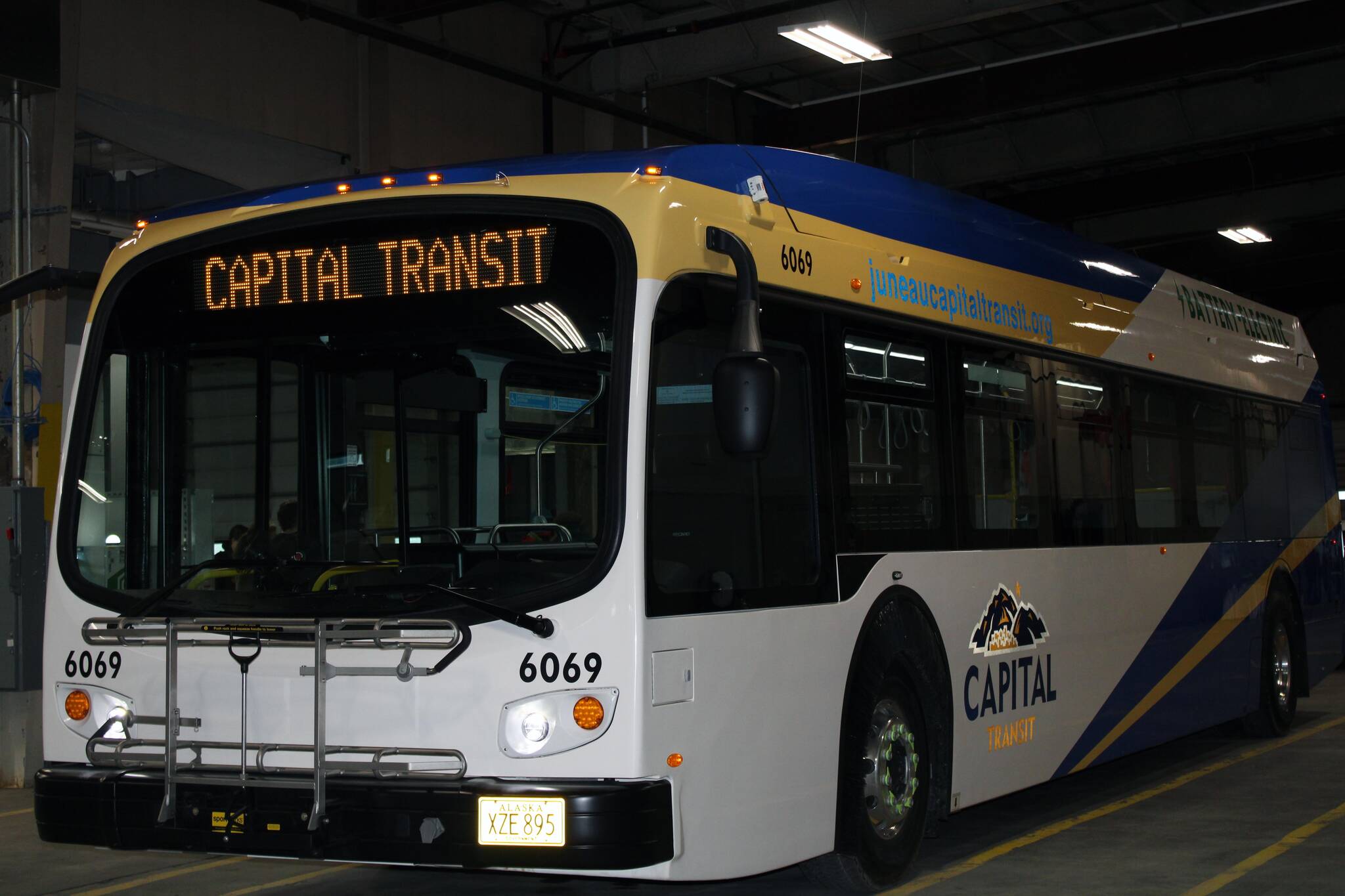Capital Transit’s electric bus is sputtering.
According to a memo shared with the City and Borough of Juneau’s Public Works and Facilities Committee this week, the state’s first municipally operated electric bus has experienced mechanical problems and isn’t holding battery charges long enough to complete an entire route during cold winter weather.
But, city officials say they remain committed to electrifying more of the city’s bus fleet.
“The tech is just improving so quickly, We’re confident (electric buses) are a good fit for the community. Like anything new there’s a lot to figure out,” said Katie Koester, director of the CBJ Engineering and Public Works Department, during the Public Works and Facilities Committee Monday.
The 40-foot bus, manufactured by Proterra, has been out of service periodically due to mechanical problems.
A powertrain wiring harness issue recently sidelined the bus for six weeks between Thanksgiving and New Year’s Day.
Although that issue is now fixed, according to the memo, more minor problems — such as issues related to the windshield wipers– still plague the bus.
[Smooth sailing for the 2022 season?]
But, the battery issues are most significant. Koester told the committee that January’s freezing temperatures have been particularly rough.
“The bus was expected to have a battery range of 210 miles which is roughly 10 hours on a bus route. In practice, the bus has only exhibited a range of 170 miles or 8 hours on a route during ideal summer weather conditions. During cooler fall weather the range was reduced to 150 miles or 6 hours on route and approximately 120 miles (or 5 hours) in January,” the memo reads.
Richard Ross, transit superintendent, explained that the colder it gets outside, the more energy is needed to heat the inside of the bus–which drains the battery’s efficiency.
Based on the reduced battery capacity, Capital Transit workers must swap out the bus before completing an entire 8-hour shift.
In addition, because of the length of the bus, it can’t run some routes that require a tighter turning radius. The electric bus is too long to service riders on Douglas. So, the electric bus mostly runs the commuter routes between downtown and the Mendenhall Valley.
Looking forward
City officials say they are looking at other manufacturers and checking with cities in colder climates to learn more about electric bus performance before agreeing to purchase additional vehicles.
Currently, Capital Transit has a grant pending with the Federal Transit Administration and the Alaska Department of Transportation and Public Facilities to purchase seven additional electric buses.
According to the memo, there’s currently a 12-to-18-month lag between when a city orders an electric bus and the manufacturer delivers the bus.
Gillig and New Flyer also manufacture electric buses. Gillig made the city’s fleet of diesel buses.
[How to weigh in on options for a new City Hall]
About the electric bus
Last April, the electric bus started carrying passengers after a ribbon-cutting ceremony attended by state and local officials, including Gov. Mike Dunleavy, state Sen. Jessie Kiehl, Juneau Mayor Beth Weldon and Alaska Department of Transportation and Public Facilities Commissioner John MacKinnon.
U.S. Sen. Lisa Murkowski, who called the bus’s introduction “a great step forward for Juneau,” appeared in a video message at the event.
Because the bus is powered by hydroelectric, Weldon said the bus would “run on rain,” a plentiful resource in Juneau.
During his remarks, Dunleavy said the electric bus is a “terrific bargain” as it only costs about 5 cents a kilowatt-hour to charge the 40-foot vehicle, which seats 40 people and can accommodate larger standing crowds if needed.
“Based on cheap electricity and with the added benefit of clean air, this is a win-win across the board,” he said. “Congratulations to Juneau for doing something very special for Alaska and Juneau.”
• Contact reporter Dana Zigmund at dana.zigmund@juneauempire.com or 907-308-4891.

